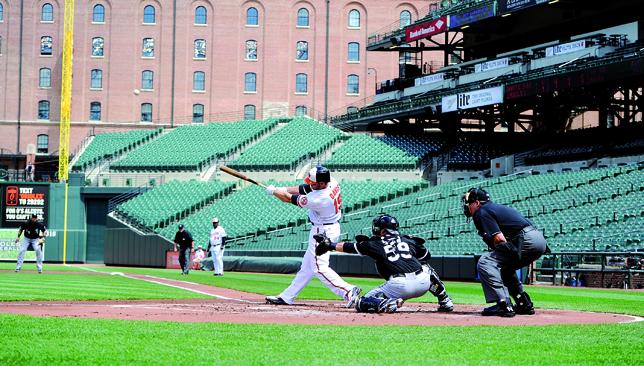
It was a scene both surreal and dispiriting in equal measure.
As the Baltimore Orioles swaggered out to take on the Chicago White Sox on Wednesday, their stadium at Camden Yards – capacity 45,971 – was empty, apart from two scouts and some journalists.
– Spurs beaten by Los Angeles Clippers in Game 7
– Mayweather insists time was right for Pacquiao showdown
– NFL draft: The winners and losers
Normally, the place would be packed. A cacophony of noise would resound from the stands.
Yet, it hasn’t been a normal week in Charm City.
The death of local man Freddie Gray, 25, just hours after being taken into police custody, has sparked fury and violence on the streets.
A smashed vertebrae initially led many to believe unwarranted brutality from officers resulted in an unnecessary killing. Friday’s revelation that six cops were charged – including one with murder – gave horrible credence to the fears.
In Baltimore, a city ravaged by crime and poverty, the relationship between the authorities and locals has been, and remains, fraught.
Behind TIME’s #Baltimore protest cover w/ aspiring photographer from Baltimore: http://t.co/6EQvgZwCP2 #freddiegray pic.twitter.com/WthM8oM0VV
— Angie Goff (@OhMyGOFF) May 4, 2015
While mayhem reigned and sirens sounded just three miles away from Oriole Park, the decision was made to play behind closed doors in the afternoon after two games in succession were postponed.
(The first on Monday night was called off just 45 minutes before the start. A 10pm street curfew ensured night games were an impossibility.)
It was simply too dangerous to stage a big local event requiring already overwhelmed police and security manpower.
There have been many soccer matches in Europe played at empty stadia, yet such a move is unheralded in the United States. This was an
unwelcome historic first.
As pictures were beamed around the world showing balls smacked into the swathes of empty seats, a nation rubbed its eyes in disbelief.
Around 50 fans had congregated outside the locked gates. Others watched the action unfold from nearby hotels.
People weren’t entirely sure how to react. Indeed, the TV commentators were puzzled – at one point they were forced to pretend to be at the Masters talking in the kind of hushed tones reserved for a winning putt at the 18th.
The players tried to make light of it, too. Home-team catcher Caleb Joseph waved to invisible fans while pitcher Ubaldo Jimenez signed autographs in thin air.
Yet, there was an underlying sadness. The rioters who have jumped upon a bandwagon for no other reason than to rebel against a society they’ve already lost faith in, have sent the city into meltdown.
#Violence is not the answer. We must have #peace in our #city, we are a city that’s built on #Believing in each other. #BaltimoreRiots
— Ray Lewis (@raylewis) April 28, 2015
Of course, there are deep-rooted sociological problems engrained in this incident.
Certainly, the killing of Ferguson teenager Michael Brown last August which sparked similar scenes of chaos and disorder reignited fresh debate about the treatment of African-Americans by police.
It will take more than a closed ballpark to remedy them.
While the anger over Gray’s death is understandable, the sight of protesters taking advantage of all the unrest to wreak their own havoc on the shops and businesses has saddened and angered millions.
Legendary Ravens star Ray Lewis took to the internet to let rip with an emotive, heartfelt message pleading for calm, as did New York Knicks star and Baltimore native Carmelo Anthony.
For the record, the Orioles beat the White Sox 8-2. The feeling afterwards, however, was one of sadness and a spate of discomfort.
“One part of me says this is bigger than baseball,” said White Sox centre fielder Adam Eaton.
“Another part of me says we shouldn’t adjust to what people do outside the stadium.
“I’m trying to be as delicate as possible with that, but I think normalcy would be good for the people around the city.”
Orioles star Chris Davis, however, felt the call to keep the fans away was correct.
Wow… Praying for Baltimore and those who are helping the city get back up.
— Chris Davis (@CrushD19) May 1, 2015
“It hit me when I made contact and you can hear it echoing of empty seats,” he said. “I watched the news more in the last couple ofdays than I have in my whole entire life.
“Just to see the anger, the emotion, the frustration of the city the last few days was shocking.
“It’s frustrating. I understand why people are upset and rightfully so. It’s unfortunate that it’s escalated to what it has. I think a lot of people were trying to do things the right way.”
Some locals wanted to play ball, desperate to show the rest of the country that Baltimore won’t be stopped in its tracks.
“So many chances were lost by locking us out,” Brendan Hurson, a public defender, told The New York Times.
“It sends the wrong message about what this city is really about.”
Maybe, yet the sight of a totally empty ballpark was enough to serve notice of the nightmare which has brutalised Baltimore.